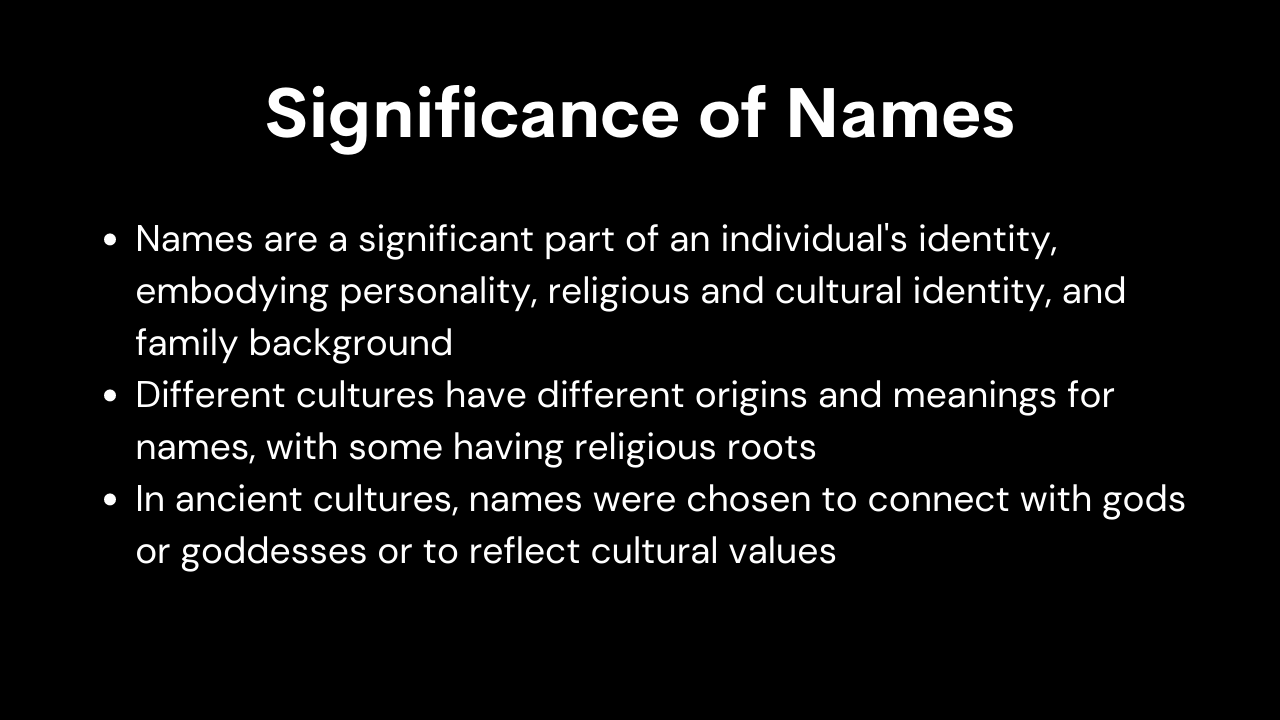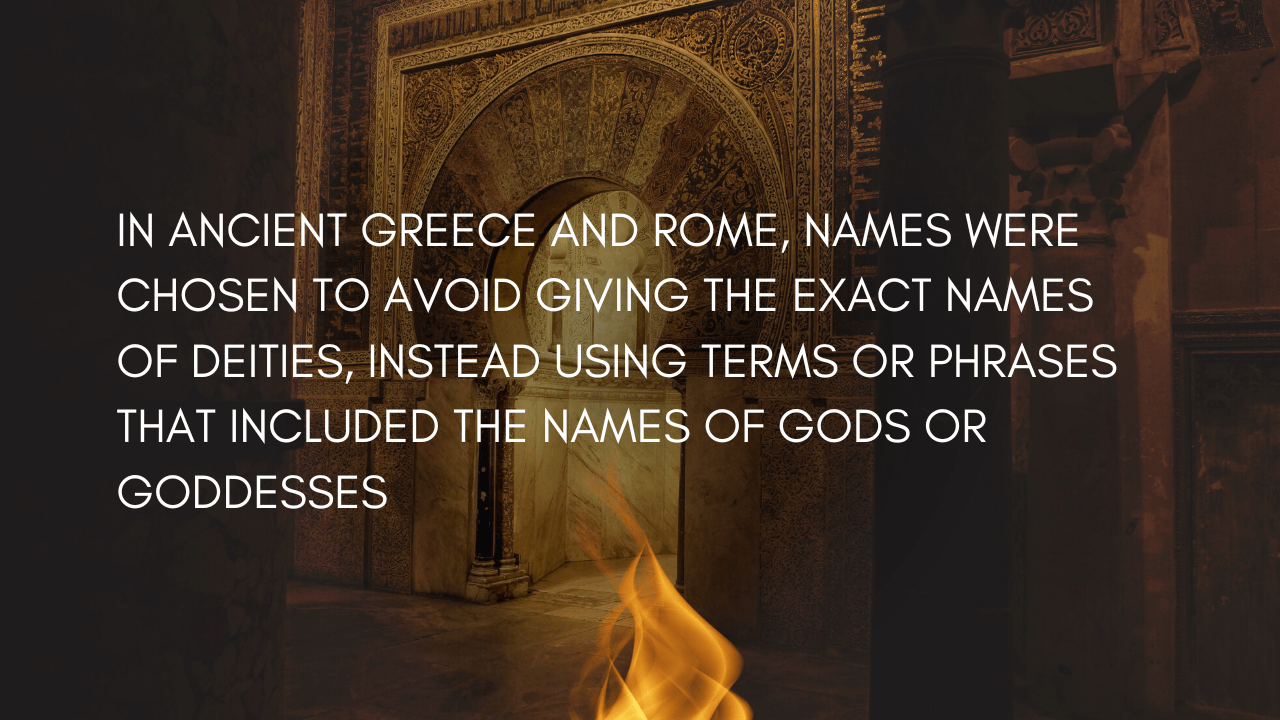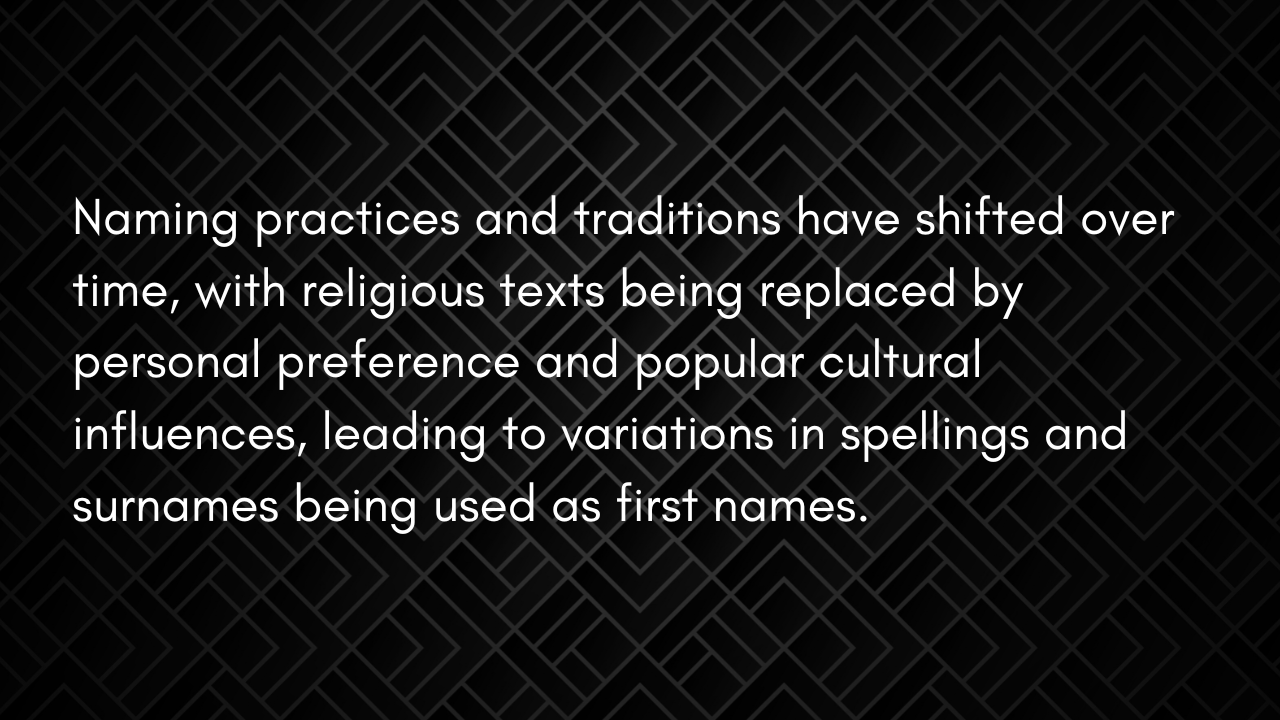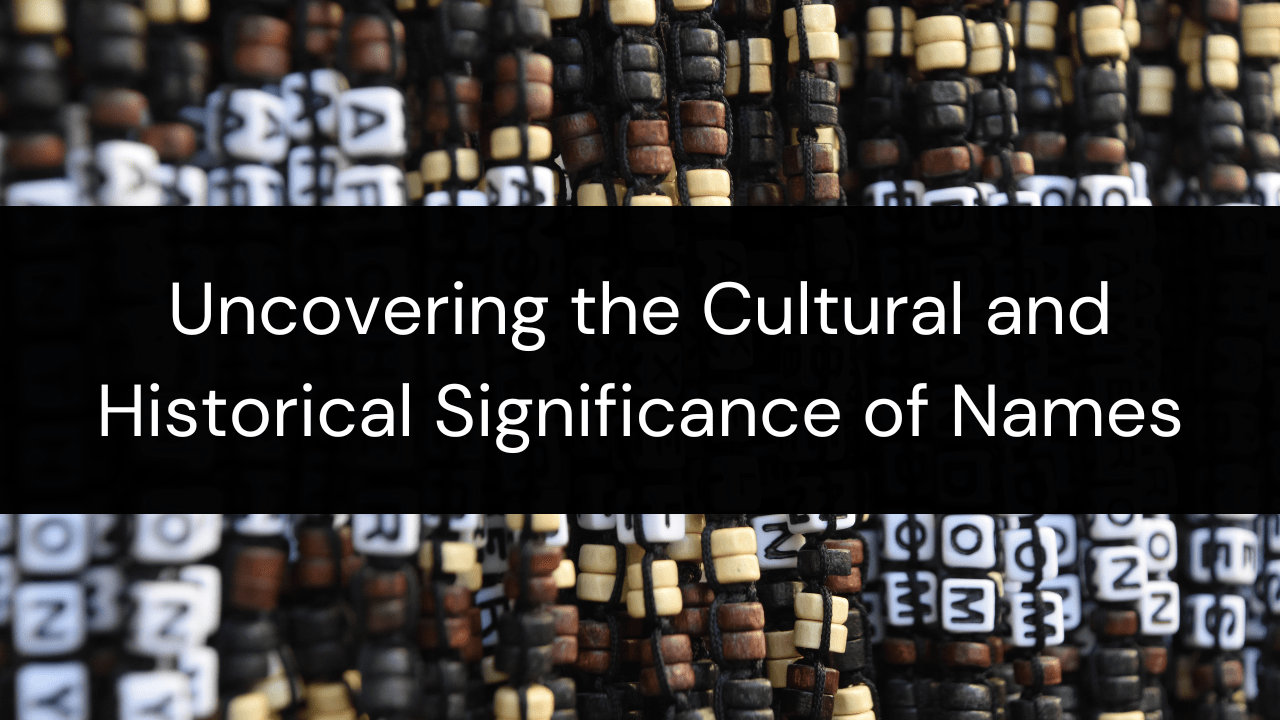In this blog, we will explore the cultural and historical significance of names. From ancient cultures to modern times, names play a vital role in shaping an individual’s identity and personal connection to their family, community, and spirituality.
We will delve into the religious and cultural origins of names, examining how names have been chosen and used throughout history to reflect cultural values, connect individuals to their gods and goddesses, and communicate messages of hope and purpose.
I. Introduction: The Importance of Names in Different Cultures
Names are a significant part of an individual’s identity. They embody a person’s personality, religious and cultural identity, and family background. Not only do they make us unique, but they’re also immensely personal to us. It has been proven that names have a profound psychological effect, as hearing our names makes us feel valued and important.
You may have noticed that you instantly feel offended whenever someone mispronounces or misuses your name. This is because we hold a personal connection to these identity markers.

This does stand true for each individual, but names hold different meanings in different cultures. They can represent an individual’s connection to God, the day or month they were born or even traits of their ancestors. In this article, we will uncover the cultural and historical significance of names.
II. Cultural and Historical Context of Names
As mentioned, every culture has its own origins for every name, and they have different meanings for individuals, their families, and the communities they are part of:
A. Ancient Cultures
Names that come from ancient cultures have religious roots. People from these civilizations believed that names should connect with the gods or goddesses they worshipped and reflect their cultural values.
In ancient Egypt, the names were picked based on the baby’s character and to devote the child to a particular god. Many names, however, were simple words such as nouns and adjectives: Karim (noble), Ammon (hidden), or Rana (beautiful). They also named them after pharaohs and Gods. Names like Isis (goddess of magic), Seti (names of two pharaohs of the 19th dynasty) and Nefertiti (Queen of the New Kingdom, which means “the most beautiful.” were commonly heard during the time.

This was different in Ancient Greece and Rome. People from these civilizations avoided giving their children the exact names of their deities, as this was seen as an act of hubris. Instead, they used terms or phrases that included the names of their gods or goddesses. These are called theophoric names. Here are some examples:
- Marcus or Martin means “of Mars.”
- Diódōros means “Gift of Zeus”. Zeno and Diodorus are also derived from the same God.
- Aria comes from Ares.
- Isidora and Isidoros come from Isis.
- Theodoros means “Gift of a deity.”
- Hermione and Hermippos are from Hephaistos.
It was also common for Greeks and Romans to give their children the names of their grandparents. If a son were born, he would be given the name of his paternal grandfather. In case the parents had a second son, they would name him after the maternal grandfather.
For girls, they would give them names normally used for boys and alter them at the end to make them sound feminine. It was Greek culture not to mention respectable women by their actual names but for etiquette, address them as “the wife or daughter of….”
B. Religious Significance
The religious significance of names might be the most important, as most words can be traced back to religious texts. According to Christians, biblical names are connected to family ties, and different aspects of a child’s birth, and indicate a new direction in a person’s life. They also believe that biblical names can be used to communicate God’s message and develop a connection with him.
Muslims believe that children have three rights over their parents, and one of them is being given an appropriate name. In Islam, names are highly significant because they affect the child’s development and interaction with everyone they are surrounded by. Names for Muslim children are usually in Arabic and picked from the Quran, as those words link the baby to its Creator.
Among Jews, there are two ways to name children. Ashkenazi Jews use the names of relatives who have passed away. They believe this allows the baby to attain their predecessors’ better qualities. However, if the parents prefer to give them a different name, they can choose one with the same initial letter as one of their predecessors’ names. Sephardic Jews follow the same practice but name their babies after a living relative. Both Sephardic and Ashkenazic Jews sometimes select names using the Torah if it is related to the baby’s aspirational qualities.
C. Regional Variations
There are different naming devices worldwide, with names holding distinct meanings for different individuals. In Asia, more than other continents, the naming system is especially sophisticated. Various names are used for different audiences. Some are only for close relatives, while others are official names for documents. They also have various names based on gender, religion, ethnicity, class, country, and caste.
In the Americas, there are multiple naming traditions due to their diversity. Names are a form of cultural or religious identity and expression of creativity, aspirations, and personal values.
III. Different Approaches to Naming
After the birth of a child, the parents tend to hold a ceremony, announcing the name or performing a ritual in order to bring the child good fortune and health. Every culture and community has its own naming tradition; these are all significant as they play a role in shaping the baby’s personality.
A. Traditional Practices
People from different areas around the world name their children according to their religions and cultures.
In China, children get their father’s family name. However, their personal names are decided at birth and usually contain one, two, or three Chinese characters. Since there are over a thousand Chinese syllables, you won’t normally find two people with the same name.
It is common practice for Chinese parents to name their children based on their gender, the decade they were born in, and most commonly, their personality. For example, Jing means quiet or calm, Min means clever, and Xiu means graceful or elegant.
Similarly, In America, a child’s family name comes from the father. This is because American names are patrilineal by tradition. Most of the well-known names have biblical roots, such as Matthew, Jonah, Noah, David, and James.
In India, parents maintain a birth chart or a “Janam Patrika” from when their child is born. This chart follows the baby’s horoscope using the position of the planets and stars at the time of birth. Twelve days after the baby is born, the parents conduct a “Namkaran Ceremony”, where the name is decided based on the time and place of the birth.
This is somewhat similar in Africa. While children aren’t given names based on astrology, they are still named based on the time of the day or the season of birth. In Kenya, Tanzania and Uganda, it is common to name children “Kibet”, which means day, or “Kiplagat”, which means night. Here are some other popular examples:
- Kojo means “born on Monday.”
- Badru means “one who is born on the full night.”
- Hamisi means “born on the fifth day of the week.”
- Kwaku means “One who is born on a Wednesday.”
- Edet means “born on a market day.”
B. Modern Practices
With time, many naming practices and traditions have shifted. Where people used religious texts to name their babies, now it’s common to name them whatever they like.
Ancient Greek and Roman names have been “Christianized”. Most of the modern Greek names are based on saints, but it is not uncommon to find names like Alexander or Demetrios in this era. The tradition of naming children after their grandparents has also faded.

In America and the UK, French names became famous for girls during the 60s. Around this period, there were many Emmas, Jades, Natalies, and Nicoles! At the same time, boys had Anglo-Saxon (relating to Germanic peoples) names such as Chad, Harold, Frank, and Robert.
In the 21st century, it has become popular to use surnames as children’s first names, e.g. Madison, Riley, Addison, Hunter, Taylor, and Mackenzie. While this practice is still in trend, people now have names with unusual spellings. The name Emily can be spelled Emilee, Emilie or Emmalee. Similarly, you’ll find several variations for the name Tristen which can be spelled in the following ways: Tristen, Tristin, Tristian, Triston, and Trystan.
You’ll also now see people with names that are simple words with no deep meaning or cultural context. The most popular examples are the children of celebrities. You might recognize the names Stormy and bear! Aside from these, names such as Stone, cash, and Chase are fairly common in Europe and America.
It is also common for individuals to change their names for a number of reasons. Some of them are:
- to define themselves better
- to recover from a traumatizing event
- after a divorce
- after transitioning to a different gender.
These are common reasons for name changes, but many people do this for highly personal reasons.
C. Impact of Globalization
Like other aspects of a person’s identity, globalization has significantly impacted naming practices and their meanings. Due to the growing diversity in every nation, people are influenced by other cultures and traditions. They are inspired by other languages and names suitable for their children.
IV. Conclusion: The Significance of Understanding Naming Traditions
In modern times, naming practices evolve with societal changes and global influences. Parents are increasingly drawn to unique and meaningful names for their children, often combining cultural, familial, and personal preferences. Additionally, technological advancements have led to the emergence of tools like couple name combiners and three name makers, reflecting contemporary trends in naming choices.
Learn more about Couple name combiners, three name makers, and other name combiners

